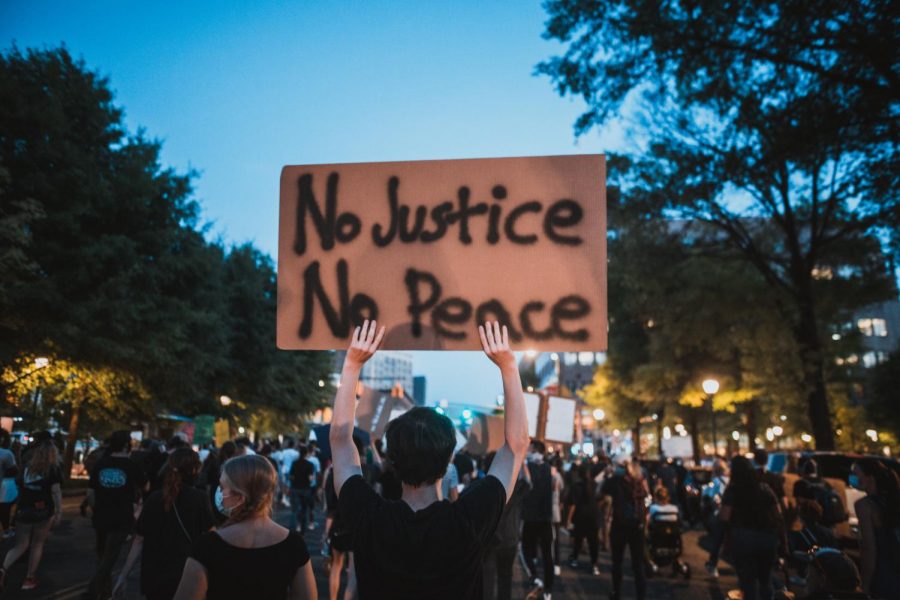Seybert: The truth behind defunding the police
Opinion Columnist: Addi Seybert breaks down the ‘Defund the Police’ movement.
Sep 21, 2020
Amidst the recent Black Lives Matter movement, there has been a call to defund the police. If you’re like me, the thought of defunding the police confused me at first. Defund the police? Wouldn’t that just make their jobs even harder, and subsequently lead to even more unnecessary deaths or violence? As it turns out, the answer is no. Defunding the police is a rhetoric that is rapidly gaining momentum in our country’s political climate, and the reasoning behind it is more than just “punishing” the police.
The fact of the matter is, police officers in this country deal with a lot. They are expected to know how to do an insane amount of things: de-escalate tense situations, handle incidents of domestic violence, investigate numerous murders, monitor traffic, respond to noise complaints and everything in between–all while also trying to keep the peace. No one human could possibly be expected to know how to do all of these things adequately without proper training.
The profession of nursing has often been compared to a career in law enforcement, as they both entail high stress, serving the public, and the ability to de-escalate a situation. However, to become a nurse in the US, one must first attend college, study the field of medicine, and do a post-graduate internship supervised by a doctor or other medical professional. Police officers, on the other hand, are only required to be at least 21 years of age, have a high school diploma, and complete physically demanding training. That’s it. With such a drastic difference in eligibility requirements, it is no wonder why police officers have higher rates of violent incidents or shootings (aside from systemic racism, but that’s a topic for another day); they are simply not equipped with the proper training to know how to do every aspect of their job. And without proper training in such a stressful and demanding job, something bad is bound to happen.
This is where defunding the police comes in. The concept first gained traction after the tragic murder of George Floyd, when he was killed during an altercation with Minneapolis PD. People were outraged, and rightly so. Citizens were dying, and no one was doing anything about it. Then there was an idea: what if we were to take money away from the police departments (i.e. defund the police) and put that money towards other disciplines, such as social work or mental healthcare? To some people (including myself at first), it sounded crazy. If we take away police funding, how can they be expected to get more training? Don’t we want police to have more training, if that’s the main issue anyway?
The answer is yes … and no. Police officers need to be able to focus on their most important responsibility (keeping the peace), which absolutely means that they need more training. However, by defunding the police, the training officers receive would revolve only around their primary duty, which means that they would be able to get really good at it without having to factor in other disciplines. Essentially, defunding the police means that police officers would have more time to train more in-depth, as they would no longer have to train for the re-allocated duties.
So where would the funding go? The funds that would be taken away from the police would then be funneled into separate but related professions, such as social work or mental healthcare. These fields have professionals that are educated and thoroughly trained in dealing with delicate things such as domestic violence, mental illness or psychosis, de-escalation of a situation and more. This would take the burden off of the police’s backs and allow for professionals in their respective fields to do what they were trained to do.
With more time for police training and funds re-allocated to other professionals, the rate of violent incidents involving police would fall. No longer would they be stretched thin across all of their duties; they would have help in their roles of protecting the community, while also being more adequately trained in their own field. This would not only benefit the officers, but the community as well. The community would have better access to mental health or social work professionals, subsequently allowing the rates of violent incidents to fall.
Defunding the police is not about punishing cops–it’s about wanting to better serve the community by bringing in help from other sources. All everyone wants is for citizens to be safe, and defunding the police is the best way to ensure they are.



















Elayne Darling Bice • Sep 27, 2020 at 1:37 am
Well done, Addi Seybert. Unfortunately, a certain segment of the population have hijacked this word to mean taking away all the money from the police.